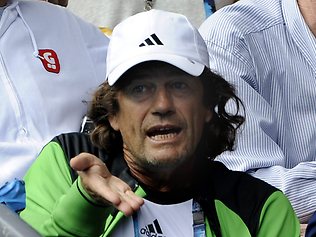How is Your Tennis Coach Performing?
1 Feb
 My last post The Formula for Perfect Tennis Practice discussed the 5 key ingredients of world-class practice. My first reaction upon learning these key factors was to realise how inadequate my own practice was (or the activities that I used to call practice).
My last post The Formula for Perfect Tennis Practice discussed the 5 key ingredients of world-class practice. My first reaction upon learning these key factors was to realise how inadequate my own practice was (or the activities that I used to call practice).
Now that you have this awareness too, you can give your coach a report-card.
Rate Your Tennis Coach
Here are the criteria you should be using to assess them.
- Are they regularly identifying goals for you?
- Defining specific skills and abilities to improve – is there a plainly stated specific purpose to every lesson and every shot?
- Is he or she pushing you to extend beyond your current abilities?
- Are you getting continual feedback?
- Are you being given things to work on (homework) outside your coaching sessions?
When I think back over my coaching, there was a lot of going through the motions. Hit some forehands, then switch to backhands, then a few volleys at the net, then a couple of smashes, and some serves to finish. It was very predictable and mostly well within my abilities. In contrast, good training means attempting specific things that you are just (or not quite) capable of – until you become comfortable doing what you couldn’t before. Then you strive once more for the next level, which may have previously been unrealistic, but is now just out of reach.
An Important Role for Parents
For young kids learning the basics of tennis, developing a love for the sport is the most important role of a coach. As children grow older and more self-driven, the technical expertise of a coach (and their track record of having produced top players) becomes more important. Accordingly, players will generally change coaches a few times as they advance, because their needs change over time. Because of these changing needs and the importance of having the right coach, the research of Benjamin Bloom (Developing Talent in Young People) found that choosing coaches was one of the most important roles of parents.
So how does your coach measure up?
If they are falling short, talk to them about what you’d like them to do more of. Junior players and their parents often delegate responsibility for improvement to the all-knowing coach, but your coach is not supposed to carry you all the way to success. Your coach may have 100 other students – do you think he or she is taking them all to the top? No way.
Consider that in any coaching group, typically none (and sometimes one) will make it to the pro ranks. So if you have big goals, it is illogical to believe your coach will carry you to the top. This is YOUR responsibility. So get your coach working for you (not the other way round). And keep educating yourself about performance (read this blog) and read about the top players in tennis and other sports. You need to know what it takes.


No comments yet